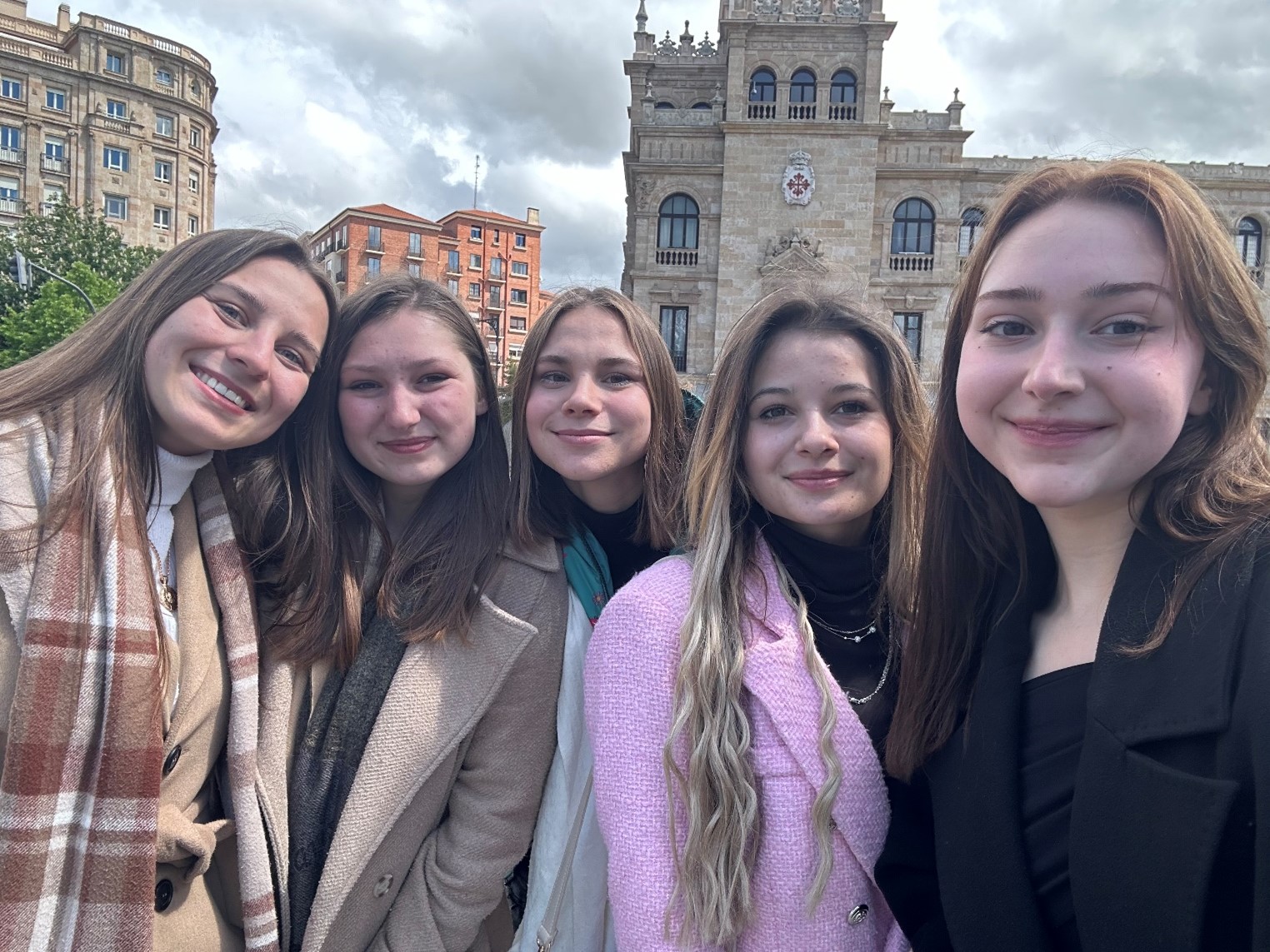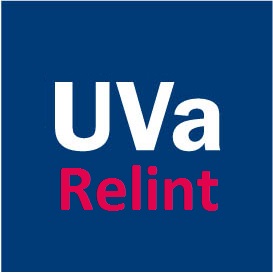For more than 7 years, UNFU has been closely cooperating with the University of Valladolid (Spain) under the Erasmus+ academic exchange program.
The University of Valladolid has a similar educational and scientific profile to the Ukrainian National Forestry University and trains specialists in forestry, engineering, economics and management. UNFU students have the opportunity to undergo training for one or two semesters at a partner university under the Erasmus+ program with the possibility of re-crediting their studies upon returning to home university.
This spring, five students of our university are studying in Spain: Veronika Butsyk (group MZED-21), Anna Samotos (group MZED-21), Victoria Grenyukh (group ICT-31), Yulia Sapsa (group KN-31) and Daria Belik (group SPG-21).
The students’ answers to the most common questions about studying under the Erasmus+ program are in this article.

1) What is the amount of the scholarship and where do you live?
Veronika Butsyk: “The amount of the scholarship is 1100 euros per month. I want to note that this amount is enough for all possible needs. Taking this into account, I live in a wonderful apartment in one of the best areas of the city with all the necessary living conditions.”
Yuliia Sapsa: “The scholarship amount is similar. This amount is enough for everything a student needs for a comfortable life. I live in Valladolid, Spain, in an apartment, because it is more profitable and comfortable than living in a dormitory. The city fascinates with its architecture and atmosphere. There are a lot of events happening in the city itself, and university organizes interesting thematic events for students.”
2) What are your impressions of the host university?
Daria Belik: “The University of Valladolid has a very nice and friendly staff, teachers are attentive and always happy to help. All buildings have modern equipment, access to a common Internet network, and there is also a large library with access to a variety of resources, such as scientific articles, documents and books.”
Yuliia Sapsa: “Studying in Valladolid for the second semester, I can confidently say that the university has exceeded my expectations. There are many different and modern campuses located close to each other, well-developed infrastructure. The learning process is extremely exciting. The university staff and professors are interested in helping students and making their studies more interesting and useful.”
3) What disciplines do you study?
Darya Belik: “At the University of Valladolid campus in Palencia, I am studying Forestry Engineering. Most of the subjects are directly focused on forest management and basic forest operations, disease and pest control, but there are also subjects on forest soils and carbon sequestration, hydrology and geobotany. Special attention is paid to the problem of global warming and carbon sequestration.”
Viktoria Hreniukh: “I study at the Industrial Engineering program, where I study programming, modeling, and environmental issues. This semester there were more different disciplines, and I chose the ones that were most suitable for my specialty.”
Veronika Butsyk: “I study the disciplines related to my specialty “Management”: “International Trade”, “Human Resource Management”, “Consumer Behavior”, “International Law”, “Rhetorical Technologies”.
Yuliia Sapsa: “In the second semester I am studying the Industrial Engineering program. I am studying such disciplines as Industrial Informatics, Systems Dynamics, Technical Project Development, and Final Project. My favorite subject is Technical Project Development. In this course, we learn how to develop our own product from scratch, brand promotion, how the industrial sector works, and so on. In a fairly short period of study, together with the professor, we visited several places where they demonstrate the manufacture of products, the use of 3D modeling and artificial intelligence in design. As for the Final Project, the student must develop a specific application or other products, depending on the goals and competencies of the student. The student is provided with a mentor who coordinates his or her work, gives feedback, makes adjustments to the project, etc. In fact, this can be equated to a small internship, because in this case you complete certain tasks from the teacher, have meetings and discussions, communicate with different people, etc. I like this format of work because I have the opportunity to delve into technologies that I have not studied before and improve the knowledge I have already acquired. In general, the learning process in this program is quite intensive in terms of practical tasks. We make a lot of presentations, work in groups, share experiences and opinions, which helps us to improve our public speaking skills and English language proficiency.”
4) What are the main differences between studying in Spain and Ukraine?
Daria Belik: “In my opinion, the main difference is the number of hours of study and the availability of practice during the course of study, not just at the end of the semester. There is no division of classes into lectures and seminars, only one class per week, the format of which depends on the teacher’s program, so the learning process is combined. An interesting point is that the teachers are not only Spanish professors, but also students who, like the program participants, came from different parts of the world. It is really very impressive how sometimes ordinary things are revealed from the point of view of a representative of another country. I like this system because the presentation of the material is well organized, and the amount of information received is quite enough to complete the tasks. Practical classes are very interesting because they are taught by teachers with different qualifications, who are usually participants in environmental programs and projects. The university has the opportunity to rent transport, so we went on study tours to quite remote places in comfortable conditions.”
Viktoria Hreniukh: “The biggest difference is the interactive learning of the subject. In Spain, we are often shown video examples, and there are educative mini-games organized for students, where we dive deeper into the subject.”
Yulia Sapsa: “Compared to the first semester, I stick to my opinion that the most significant difference is the approach to the presentation of the material and the interaction of teachers with students. In pairs, we have a lot of practice, as well as group projects, regardless of whether it is a lecture or a laboratory class. In my opinion, this is very important for improving communication between students and group work skills. I have also noticed a tendency for teachers to be interested in students’ assignments. Almost every class we review the work done and, if necessary, we can ask the teacher for help. Or there is another option to write to the teacher directly by e-mail and get a fairly clear and quick answer to your questions. There are no major differences in the learning process. Here, students also do labs, write tests, and answer questions in class, just like in Ukraine.”
5) What advice would you give to those who are hesitant to study abroad?
Daria Belik: “If you are confident in your knowledge and skills, you should always try, because this experience will open up new opportunities. Before this project, I had never been abroad, and the decision to study abroad was very exciting. But now, after living in Spain for several months, I can say with confidence that life and studying here generally differs only in language and rhythm.”
Yulia Sapsa: “My advice is to stop hesitating and get out of your comfort zone. Studying abroad is an opportunity to understand what an independent life is. It also means new friends, a lot of memories, traveling, etc. I would like to sincerely wish success to all the participants of the selection, because this is an opportunity to change your life quite dramatically for the better. Let no difficulties stand in your way!”
6) What are your plans after returning to study at UNFU?
Viktoria Hreniukh: “First, I want to finish my studies, but now I would also like to tell other students about the various opportunities to study abroad so that more students would participate in them.”
Yuliia Sapsa: “I think that, like most students, my goal will be to continue my studies at UNFU and get a bachelor’s/master’s degree in my specialty. Despite this, of course, I have many more plans and ambitions, but they are not directly related to my studies at the university.”
7) How did mobility affect you personally?
Viktoria Hreniukh: “Thanks to mobility, I became more independent and more resistant to stressful situations. Despite all the difficulties and missing my home, mobility is worth it, because you immerse yourself in a new culture and gain incredible life experience.”
Yulia Sapsa: “During the entire period of studying under the Erasmus+ program, I met many wonderful people. We are still in touch with our classmates from the first semester and even had the opportunity to see each other again after graduation. I also significantly improved my English language skills. Daily communication with foreigners and the learning process made English my second “native language”. Of course, staying abroad has its challenges, but different situations helped me to “grow up” morally and learn to solve problems on my own. Living in a foreign country helped me to increase my independence, communication skills, leadership qualities, etc. At first, it was a little difficult to adapt to the new culture, mentality, and language, but now I realize that Spain is an extremely colorful country with wonderful and friendly people, great culture, and delicious food!”
8) Do you attend any actions/events in support of Ukraine in Spain?
Victoria Hreniukh: “Unfortunately, I did not have the opportunity to attend events in support of Ukraine in Spain, but they exist and next time I will definitely attend them. In my turn, I always try to tell my friends about the war in Ukraine to keep people aware of it.”
Veronika Butsyk: “Yes, right after I arrived in Spain, I started attending rallies in support of Ukraine. Even when I am abroad, I cannot stay away from the events taking place in my country, so whenever I have the opportunity, I speak to international students and talk about the war in Ukraine.”
Information about the open competition for studying at the University of Valladolid is available here.

Link to the original interview here
